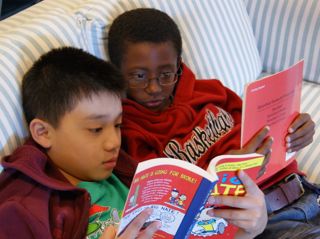Joan Moser
August 10, 2012
I am a novice at countless activities in my life - everything from golf to managing my photos in an organized manner on iPhoto to making a fabulous risotto. Last week, as I was attempting to do all three of these activities (not at the same time of course), I found myself questioning if I would ever really master any of them to a level with which I was happy. It seems as though I want to improve at all three of these activities, however, I lamented to my husband, they all take an investment of time in order for me to improve.

Reflecting on my frustration with a lack of mastery regarding these interests, I couldn't help but think back to when we were in Ann Arbor, Michigan, a couple of weeks ago. While there, we had the honor of meeting teachers from all over the world. One particular day found us deep in a conversation with a group of educators talking about those students who come to us with a pronounced deficit in reading skills compared to their classmates. All of us weighed in on the cause of these deficits; who seems to be most at risk, strategies that can support these students, and the role we play in their success and growth.
Over the course of the week as we continued the conversation about how to best serve these students, one question continued to bubble up: Is it about our student's ability to read or is it more about their opportunity to read? Thinking about my own experiences, I would consider myself to have low abilities with golfing, picture filing and risotto making. However, given more time and opportunities to work on these interests, I would probably be able to reach a level of mastery I would be happy with.
The ramifications for the classroom? If we really want children to increase their ability in reading, we must provide them with exorbitant opportunities to read. If we want them to become better writers, mathematicians, critical thinkers, and problem solvers, we must provide continuous opportunities to refine and master the skills. They deserve it.





